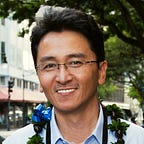Time and Again
--
You never forget your first one. That’s what they say, at least.
It’s true to a large extent, as most clichés are. But sometimes you simply can’t forget your first, because it follows you throughout your life; in some cases haunting, in other times as a gilded reminder of a glorious, golden past. It’s the rock star in twilight, still singing the old standard to bring the house down.
Seven years ago, I stepped into an entirely different world when my first documentary, “Ola: Health is Everything,” premiered. It was a journey begun as duty, something thrust onto me despite knowing nothing, and became quite possibly the most important thing I’ve ever done.
Since then I’ve done a slate of other film projects, trying to prove it wasn’t a fluke, that Ola wasn’t a one-hit wonder, developing a body of new work that examines the social challenges of our society, to add light to that darkness.
And yet Ola remains persistent and evergreen, its messages of empowerment and agency, of community and hope, perhaps more resonant than ever. Despite over 350 screenings all over the country, and thousands more online, it’s the film people keep asking me to show up in person for, the memory I can’t ever shake.
Early last week I held my third screening of Ola with the medical students at the John A. Burns School of Medicine (JABSOM). In all, over 75 future doctors gathered virtually to watch the film and to participate in a discussion about the social origins of our health and the future of medicine in a pandemic-ravaged world.
I regularly give younger generations grief; the Millennials and the Gen Z’ers, with their cynicism and smug bravado, their haughty, faux artistic temperaments spilling all over the internet in a hail of IG stories, social justice memes, and TikToks.
Yet, almost without fail, the younglings I’ve met through screenings of Ola have surprised me with their deep sincerity to right wrongs; their earnest questions about agency and advocacy, their heartfelt exhortations to do good akin to helium, lifting my hopes immeasurably for a brighter, better world. Last week’s group of young, future doctors was no different. They didn’t just want to know more, they wanted to know specifically what they could do to fix broken policies that value profit over people, to re-engineer a system that prizes development over health.
Here, writ large, is the lesson we should draw from the pandemic.
“The social origins of our health are all entangled,” I’d told them, much like our lives are all inextricably entangled. And if there’s one lesson we should learn from this pandemic it is that the health challenges of one individual, one family, or one community, have the potential to irrevocably affect us all.
That without equity, nothing we ever do in health care will matter. That without the compassion for others so essential to bringing this pandemic under control, we’ll never have a safe, strong, vibrant economy or society.
That, in the end, health is everything.
It was an amazingly diverse group of medical students, reflecting the society they would soon be serving. In my closing remarks, I encouraged them all to not only embrace their differing backgrounds, but to honor their distant origins while striving to deliver on the promise that brought them together: to be healers, rather than doctors. I asked them plainly and simply to work for more than just healthy patients, but to create healthy communities.
In these closing months of darkness, I found a renewed hope in their young faces, a warm blanket of comfort in their tough questions about how to leverage what they learned in the film to make Hawai‘i a better place.
Perhaps the reason I can’t leave Ola behind is that it’s more than a one-hit wonder. It’s a timeless place I will come home to year after year, with a new set of young and eager apprentices, till the end of my days.
Perhaps it’s because no matter what else happens for the rest of my life, Ola will be the most important thing I’ve ever done, the inheritance I bequeath to the future, my eternal love letter to Hawai‘i.
